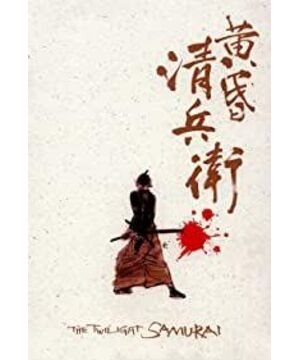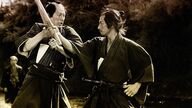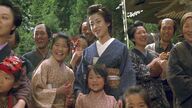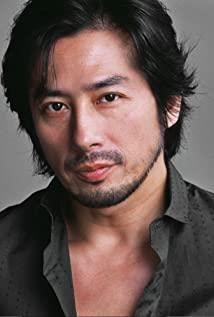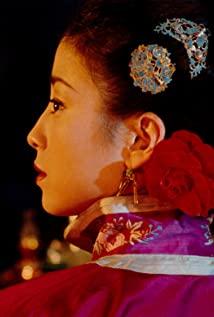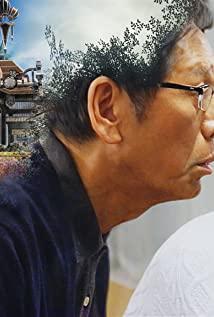In Japan, the origins of movies that focus on the lives of the bottom people are circulated, from Akira Ozu Kurosawa to Hirokazu Koeda. This film by Yamada Yoji, which shows the daily life of the bottom samurai, goes against the spirit of sacrifice and pursuit of justice shown in traditional samurai films.
As Yamada Yoji himself stated: "Japan is now in a state of unease and worry, but the Japanese values have undergone profound changes, the tradition of taking pride in diligence and thrift is slowly lost, and the blind pursuit of luxury. But samurai There is a strong sense of responsibility in their hearts, and they can be calm in the face of a simple life. For them, poverty is not a shameful thing, no matter how poor they are, they must live cleanly..."
Reflect on what...
2: What the film shows The era was the last year of the shogunate rule, around the 1830s, before the Opium War in China, and there was still a long time before the Meiji Restoration. But as the film describes, this is the end of the samurai era, the era of swords has passed, and all of Japan are ronin, and there are often headless corpses in the rivers of Kyoto and Osaka. Lord Justice is a low-level warrior in the era of the eve of this change. He lives a poor life. If something changes, he may become a ronin or a peasant. As we know at the end, the protagonist is still on the opposite side of history and was killed by a cannon while fighting the Emperor's army. It's unfortunate.
The narrative structure of the film is simple, sequential structure, and the narration of an old man is inserted. The story is soothing and plain, natural and innocent, but it carries the hardships of life and the hardships of living.
The story goes something like this: In the last years of the shogunate, Qingbingwei, who lost his wife, refused to entertain the elderly after work and went home every day in order to raise his children and support the elderly, so he was named by his colleague Qingbingei Dusk.
After the divorce of Miss Pengjiang, the childhood sweetheart of Qingbingwei,
Being harassed by his ex-husband, Qingbingwei dueled him with a wooden stick, showing superb martial arts. Since then, Pengjiang has often visited Qingbingwei's house as a guest, which has brought anger to the family, but at that time, young women were not allowed to show their faces in public, and Pengjiang was under pressure to remarry, so it was inconvenient to communicate. Therefore, Pengjiang's brother discussed with Qingbingwei to let Pengjiang marry him. Although Qingbingwei loved her deeply, he refused to let her live a poor life with him and suffer. Before long, Pengjiang decided to marry someone under the pressure of his family.
When the elder knew about Qingbingwei's martial arts, he ordered him to kill another rebellious warrior with high martial arts. Before this desperate fight, Pengjiang went to Qingbingwei's house to groom him and say his final goodbyes.
After Qingbingwei knew that Pengjiang was married to someone else, he had no intention of dueling, thinking of letting the rebel samurai escape. But the samurai's desire for death was too strong, and after a fight, he died in Huangquan. The injured Qingbingwei returned home and found that Pengjiang had not left. Their hearts broke through all obstacles and wept each other.
3 movie styles.
1. The way of expressing emotion.
eyes, tears.
2. Tone, Motion
3
Director Yamada Yoji loves to shoot the joys and sorrows of the people at the bottom. In this evening Qingbingwei, Yamada Yoji uses a dim tone, slow rhythm, steady camera movement, and soothing and clear. The soundtrack to the film creates a brutally idyllic world of samurai. There are no gorgeous clothes and bright colors here, some houses are close to the color of the land, brown clothes, and some lively green plants.
The slow-moving footage adds a lot of movement through the events within the frame, such as the fire, the steaming kettle, the wind, the flowing river, the rain, and these things make the environment come alive.
People's conversations are polite, full of ritual, and their classes are clear. When expressing emotions, she is extremely restrained. Her mother secretly weeps when she sleeps. Children born in poor families are sensible and help the boss who is working in the family. Before the battle, Qingbingwei turned his back to Pengjiang and expressed his heart, but he never looked at her, let alone contacted her. Pengjiang dresses and shaves his hair like a wife. Qingbingwei's mother asks her, "Which family's young lady are you?" She held back her tears and replied: I am a childhood friend of Qingbingwei.
After the injured Qingbingwei returned home, Pengjiang, who thought that Qingbingwei would die, was waiting at home, and the two held their hands tightly at the door. This was the only physical contact between the two in the entire movie.
Character: Twilight Qingbingwei
According to Qingbingwei's ideals, he was originally a person who had no desires and even escaped the world. When his colleagues recommended him to join the guardian of the emperor's palace, he was rejected. He deeply loves his two daughters and his aging mother, and he takes on this responsibility, which is called family.
This kind of attitude towards family is a common feature of the farming and civilized society in East Asia. The family, as a social unit, is the support for life, old age, sickness and death. Children are educated and grown under the support of the family, and the elderly spend their old age with the help of the family. Humans are born with a certain meaning. Compared with the religious meaning of the chosen people of God in the West, the Eastern peoples are given the meaning of family.
The protagonist of this film, Qingbingwei, is a part of such a typical family. He is the source of income, the backbone of the family, supporting the elderly and raising daughters. Be careful, the whole family will fall into poverty, so the implied crisis of the whole film lies in the safety of Qingbei.
The spiritual forces that support people's life are two different forces. The elderly believe in Buddhism, the mother recites the Heart Sutra, and the education of the children is the Analects of Confucius. There is a touching detail in the movie: the daughter asks Qingbinge, learns You can survive by making kimonos. Why do you need to recite the Analects? Her father told her that learning the Analects makes people learn to think.
Living at the bottom, under the system controlled by others, is uncomfortable, and even life is at stake in that era. Qingbingwei, who is full of martial arts, could have escaped this predicament, but he walked slowly through the fetters of his family, which was his choice.
There must be fighting scenes in samurai films. In Kurosawa Akira's films, the fights between samurai are fast and fierce, often creating a chilling atmosphere, and the duel between masters is often a one-shot kill. Here, the fighting of the Qingbingwei is slow and realistic. There is no escape from gravity, no overly flamboyant poses, no courage to move forward without fear of pain. In this movie, he is always on defense, just like the world treats him, he is always on defense, struggling to save his dear one, watching him have to kill for the sake of his family, such a cruel thing, Let the audience see what they can bear.
How to live in such a cruel world, is it lucky or unfortunate for Qingbingwei? At the end of the film, Eden, who is already old, said: I think my father is happy. He has a daughter he loves deeply, and he also got the love of the beautiful Miss Pengjiang. There are only good memories in his short life. Indeed, to be able to fight against such a cruel and selfish world, only love, in a cold world, can live with warmth when it is with loved ones. And the rest, what fame, what success or failure, is not worth mentioning.
View more about The Twilight Samurai reviews


